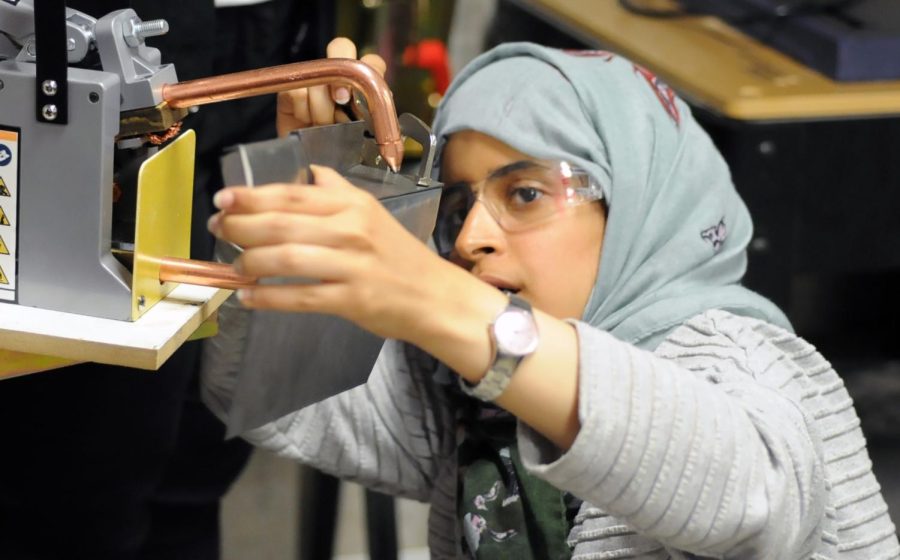Kent State, Saudi university share ideas, culture through workshop program
Aroub Baajajah of Saudi Arabia works on a project during the Effat program in the fabrication laboratory at the Center of Architecture and Environmental Design.
September 27, 2017
In June 2016, President Beverly Warren stood in front of 300 female graduates at Effat University, an all-women’s school in Jeddah, Saudi Arabia, to deliver a commencement speech.
“It was an incredible experience to see young women — 300 of them graduated — and knowing they’re going to go out and be engineers, business executives, architects,” Warren said. “Those are their three top programs. And that’s where we’re going to intersect with them.”
Since then, the intersection has begun; this summer, seven architecture students from Effat came to Kent State for a five-week workshop at the Center for Architecture and Environmental Design.
“(The workshop) was about digital design and construction methodologies, where they produced a number of really remarkable works with some of our faculty,” said Mark Mistur, the dean of the CAED.
Mistur had a hands-on approach with the Effat students, giving lectures and being part of their design critiques throughout the workshop.
“I think the … seven students who came over were among the most curious, engaged, hard-working and … genuinely committed students I’ve ever seen,” Mistur said.
During their time in the U.S., they were also taken on “field trips” — one to Cleveland and another to Chicago. Bridget Tipton, who was the guide and driver for three of the Effat students on the Chicago trip, said her perspective changed after talking to the Saudi women on their six-hour drive.
“They were like, ‘We want to get everything we can out of this experience. We want to see as much as we can,’” Tipton said, “but, all the while, maintaining the things that they believe. The majority of our conversations were around faith, identity and religious upbringing.”
Throughout their time in Chicago, Tipton and the Effat students spoke about a wide range of topics, from homelessness to the differences between Islam and Catholicism, to the roles of women and men in Saudi Arabia.
“There is an enormous barrier between men and women in Saudi Arabia,” Tipton said.
This is true both metaphorically and literally; while there are cultural and religious norms that create a divide between the roles of men and women in society, the Effat students described to Tipton a literal wall in the workplace.
“And back home, what they call the ‘mixed’ office is the one divided by a wall, because there are others that are entirely men’s firms and entirely women’s firms. So, the mixed office to them is the one where they share a wall but both work for the same company.”
Tipton said differences she discovered between her experience in the U.S. and the Effat students in Saudi Arabia helped her better understand her own place in the world.
“I’ve seen several parts of the world outside of (traveling to Florence, Italy,) so I already felt, arrogantly, that I had a complete view of the world, or at least semi-complete,” Tipton said. “I don’t have a self-centric or an American-centric or Kent-centric view of the world, even, so just hanging out with them changed that even more.”
To Mistur, the new understanding Tipton found of Saudi Arabia and Islam shows the workshop program is a success.
“We hope to contribute in ways we can, but we also look to learn and grow from there being here and our exposure to them,” Mistur said. “It was an absolute pleasure to have them here. I think that they will be our ambassadors at Effat University to bring more students over.”
Along with hopes of attracting more Effat students to Kent State for another workshop next summer, Mistur plans to expand the relationship between the two universities architecture programs.
“(Effat) would also like to have another workshop next summer, so we’re talking about doing another workshop,” Tipton said. “We’re looking at linking their students, or giving their students the option to go to our Florence program and to study there for a semester.”
Mistur is beginning a prospective plan to send Kent architecture faculty to Effat University, where they would oversee “five to 10 day intensive, on-the-ground learning opportunities” for Effat students.
“We’re currently looking for two students that will have a full scholarship: two women from our college to go to Effat University in the Spring of 2018 for a full semester,” Mistur said.
The end goal of the two universities is a full-fledged exchange program.
“I really believe that we need to build relationships to places in the world that are rapidly changing,” Mistur said. “I think that Europe is a very, very interesting place to go, steeped in history which has many lessons in it, but that we should also expose our students to places in the world that are changing.”
Nicholas Hunter is the academic affairs reporter. Contact him at [email protected].












